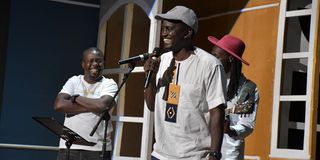Prime
Dr. Spire: Blending politics and humour

Dealing: Prof. Spire (R) says humour is one of the ways Ugandans are coping with the evils in the country.
PHOTOS/COURTESY
What you need to know:
Back in action: The intersection between politics and humour has been discussed for years, with politics taken as a serious matter and humour, well as humour.
On a Friday, earlier this year, Dr Jimmy Spire Ssentongo was among the guests invited on NBS TV to give his insights into several topical issues, including happenings in Uganda’s Parliament. Some on social media were not impressed by the idea that a ‘cartoonist’ had been invited to discuss what they termed as “serious” issues.
He could be an academic lecturer both at Makerere University and Uganda Martyrs University – outing a number of publications over the years- but to the common man, Prof. Ssentongo cannot be detached from cartoons that he has been drawing for the last decade or so.
“They think cartoonists are not serious people since all we do is make people laugh. People take humour as unserious, not at the level an academic is supposed to be,” Dr Ssentongo says.
Having made people laugh by drawing cartoons, Dr Ssentongo recently decided to storm the theatre to showcase his style of humour. This Friday, he will escalate his move into the theatre when he showcases his, This Country Laughs a Lot –a stand-up special at the National Theatre.
“Anything that happens in Uganda must have some humour around it. And this is because of the helplessness of the circumstances. It is expression but also therapy,” Dr Ssentongo says.
The question Prof. Ssentongo proposes is how Uganda entertains herself amid the gloomy situation. There are stories, he says, emerging that otherwise attract anger but then how can we milk laughter out of them?
“There are times when there is a scandal and ordinarily you would be annoyed but then people try to make fun out of them. So, the theme of this show is how we are making humour out of our circumstances,” he says.
The downside of this is that serious matters might be lost in humour and this is something that Dr Ssentongo is cognisant of. The show is supposed to highlight all those things.”
Dr Ssentongo does not just preach resorting to humour during very challenging situations but he has also walked the talk. He narrates how the government was ill-prepared for quarantining, talks about very trying times, and their apprehensions all of these with a tinge of humour. When they were being held up in the waiting, Dr Ssentongo says they pondered on how to negotiate out of the airport but their attention was soon taken by Pastor Samuel Kakande, the founder of Synagogue Church of All Nations, who arrived with an entourage of about six people.
“When he walked in, all the officials at the health desk suddenly got excited,” Dr Ssentongo, who is The Observer newspaper’s editorial cartoonist, wrote.
“We briefly grumbled about what had just played out before our eyes, but soon we were back to our agitation to leave the airport.”
Having put most of his ideas in ink, Prof. Ssentongo now believes there is a need to expand his audience since he believes most Ugandans are being left out as they are not passionate readers.
Prof. Ssentongo, who lectures on research methods and philosophy, says with the regime which has been in power since 1986, increasingly stifling freedom of speech, it is normal for people in the academic world to restrict themselves to the four walls of the lecture room but this is something he wants to change as he moves to the theatre.
The million-dollar question he has been asking himself is: What are we writing for?
“That’s my major drive in writing for papers and drawing cartoons and now some comedy,” he says.
Uganda is not short of stand-up comedians but Dr Ssentongo believes there is still something that is amiss or a vacuum that needs to be filled.
“We have so many ethnic stereotypes in our country and if somebody wants to be funny they just have to joke about what it means to be a Musoga, Muganda or Munyankore,” Dr Ssentongo says, admitting that partly that kind of satire reflects what is in our society but the downside is that it ends up normalising the stereotypes.




